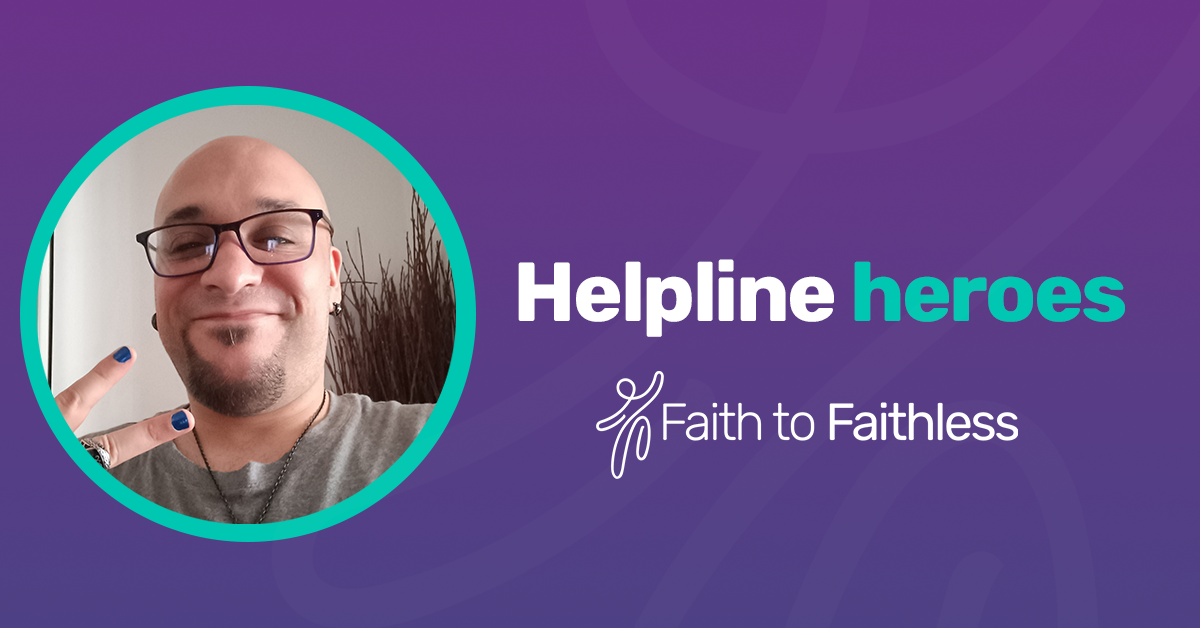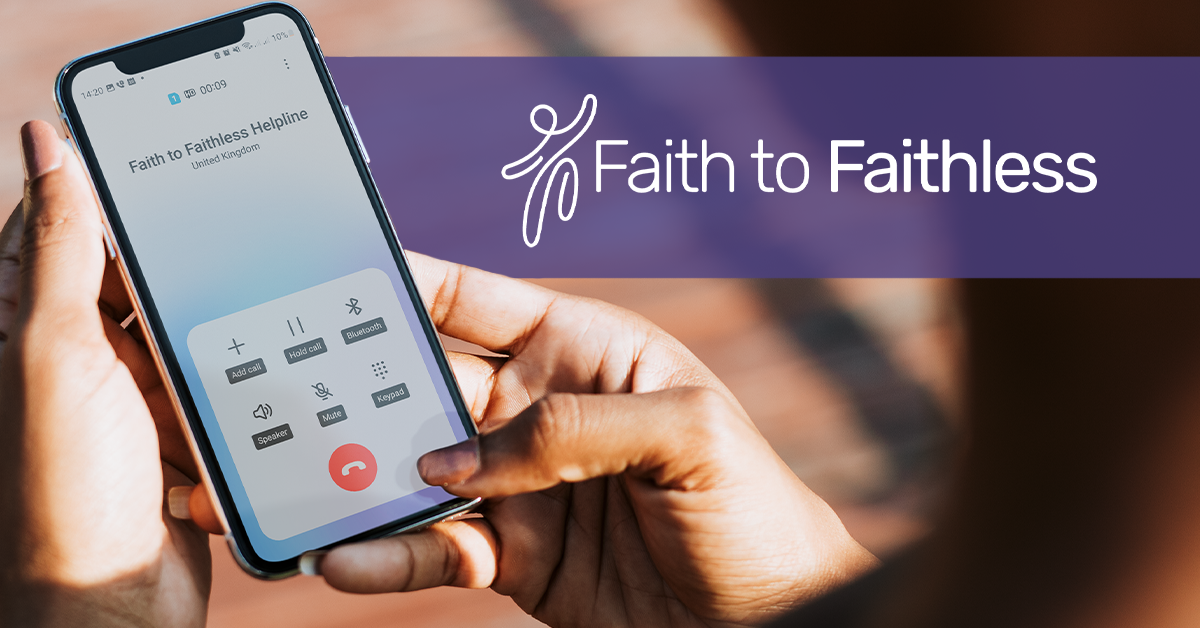
We spoke with Iacopo, a volunteer helpline operator for Faith to Faithless, our programme supporting people leaving high-control religious groups. Currently open three days a week, the helpline is operated by our team of highly trained volunteers who understand the nuanced challenges faced by ex-Muslims, ex-Jehovah’s Witnesses, ex-Evangelicals, ex-Mormons, and other so-called ‘apostates’. We caught up with Iacopo about his own experiences of leaving Jehovah’s Witnesses, as well as training with Faith to Faithless, and his work providing a listening ear for people on their own journey of leaving faith behind.
Hi Iacopo! What inspired you to become a volunteer for the Faith to Faithless helpline?
I was born and raised as a Jehovah’s Witness, and recovering from the trauma of the whole experience is something that I had to tend to pretty much on my own. I wanted to use my experience and what I’ve learned to help people in the same situation
Could you describe the training you received to prepare for the helpline?
The training focuses on how to be good listeners, remove prejudice from ourselves (cause yes, we can all have forms of prejudice), and how to make our empathy functional to this task, we learn to make sure that we use the right words in the right context and to make the callers feel helped and heard.
What is your own experience of leaving a high-control religious group?
I was born and raised as a Jehovah’s Witness, left the religion right before my twenties. I left because i was exhausted, my whole existence was supposed to revolve around doctrine and the congregation, everything in my life was supposed to be dedicated to the worship of the ‘one true god’. I was trained to neglect myself and my needs, and my passions, and everything that wasn’t directly and openly approved by Jehovah and its clergy had to be deemed satanic and therefore wrong. I was made to be active in the ministry before I could even learn how to read properly (around the age of five, which is also when I received my first door slammed at my face, an experience nobody should have to go through, especially children.
I was put on the stage to read bible and short talks as soon as I could read (around age 6). I was constantly pushed by elders and family alike, to stand for my faith at school to make myself look separated and better (a direction which every born in has to follow) I went through a never ending cycle of bullying which brought me to start having suicidal thoughts as early as 12 years of age. I can speak of this openly now because of years of deconstruction and therapy, and I will not shut up about it until high-control groups stop hurting people.
Why do you personally think the Faith to Faithless helpline is important?
As mentioned before one of the greatest issues with leaving high control groups is the overwhelming feeling of isolation that comes after leaving. Most of our callers are looking for ways to reconnect, they want to understand what has truly happened to them and if all the negative experiences they’ve been going through after leaving are part of the fallout of their experience and upbringing (they usually are). For them the helpline usually is the beginning of a process that can bring them to freedom and to build a new life that gives them happiness and satisfaction. We can’t sort everyone’s problems out ourselves, but we can help point people in the right direction.
Do you consider yourself a humanist?
Yes I do, I love rationality mixed with empathy and compassion, I love how the scientific approach can be emotional rather than cold as many would usually mistakenly assume, and I’m all about the protection of human rights.
What would you say to someone who is thinking about calling?
If you’re thinking about calling chances are that you might need to, it can be scary and in some cases you might want to get yourself in a place in which you can call us without being heard, if that’s what you need go for it, regardless of you needing information, help or just someone to talk to.

Faith to Faithless helpline
The Faith to Faithless helpline is a groundbreaking service dedicated to supporting people who have left high-control religious groups. So called ‘apostates’ often deal with social isolation, mental health issues, discrimination, and estrangement from their communities and families. The helpline, operating three days a week and staffed by trained volunteers, offers bespoke assistance, resources, and empathetic support to a diverse group, including ex-Muslims, ex-Jehovah’s Witnesses, ex-evangelicals, and ex-Mormons. It aims to bridge the gap in understanding and support for apostates, providing a crucial lifeline for those navigating the complexities of leaving high-control religious environments.
Calls are free from all mobiles and landlines and won’t appear on itemised bills.
Wednesday 10:00 – 13:00
Thursday 16:00 – 19:00
Friday 08:00 – 11:00
Freephone: 0800 448 0748
You will also be able to email helpline@faithtofaithless.com for support, and emails will be replied to during our usual opening hours.
Notes
For further comment or information, media should contact Humanists UK Director of Public Affairs and Policy Kathy Riddick at press@humanists.uk or phone 020 3675 0959.
Faith to Faithless has been a programme at Humanists UK dedicated to providing specialist support to apostates since 2016. Beyond the helpline and its year-round provision of peer support from trained volunteers, the service offers awareness training to public services, including NHS divisions and police forces.
Faith to Faithless operates under a stringent safeguarding policy, prioritising the safety and wellbeing of all those reaching out for support.
Humanists UK is the national charity working on behalf of non-religious people. Powered by over 120,000 members and supporters, we advance free thinking and promote humanism to create a tolerant society where rational thinking and kindness prevail. We provide ceremonies, pastoral care, education, and support services benefitting over a million people every year and our campaigns advance humanist thinking on ethical issues, human rights, and equal treatment for all.
